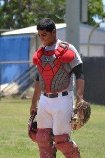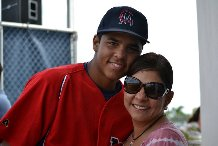International Player Finds Solace On The Baseball Diamond
 If a professional baseball team has not taken notice of a player in Venezuela by the time he is 16 years old, then it’s over. There is no more baseball.
If a professional baseball team has not taken notice of a player in Venezuela by the time he is 16 years old, then it’s over. There is no more baseball.
The system can be hard and mean. There are few fields to play on. In the capital of Caracas, for example, there are only seven baseball fields available for use. Many young baseball players lose opportunities as field usage is decided by bidding wars from the most wealthy. Many of these players don’t have many chances. Often times as these children fail at baseball, they also fail at school and fall into drugs and trouble.
There are plenty of talented players, lots of competition, kids with good potential, but it is wasted because so few get the chance to harness that talent.
“There is so much opportunity to play and to be seen here,” said Chaminade-Madonna sophomore Juan Martinez, who moved to the United States from Venezuela last year and now plays catcher for the Lions. “That’s the best part. I can go to a park and play two blocks from my home now.”
In Venezuela, baseball is king. It is the nation’s most popular sport, beloved by its president, Hugo Chavez, and promoted enthusiastically nationwide. Fans are passionate for the sport, and it is played year round to packed stadiums. Children are becoming increasingly more excited as they see more and more of their countrymen finding success in the major leagues, players such as the Detroit Tigers’ Miguel Cabrera, Magglio Ordonez and Carlos Guillen, the Colorado Rockies’ Carlos Gonzalez, the Seattle Mariners’ Felix Hernandez, New York Mets’ Johan Santana and the Texas Rangers’ Elvis Andrus.
In the Martinez household, baseball was always a way of life, as Juan’s father played as well and helped his young son learn the game starting from age 4. Dad talked baseball all the time, and little Juan developed a love for the game as well. By age 12, he had played his way onto the Venezuelan National Championship team in 2007, starting 13 games in a row at catcher and earning MVP honors.
”I actually got sick the last day, when we won,” Martinez said. “I was so exhausted I could not celebrate with my team. But I knew I did my job for my team, so I was happy.”
Last year, Martinez got the opportunity to come to the country and learn the language and learn the culture. It had always been his dream to come to the United States, and even though he was a homebody who missed his mother and his family, he was excited to be given such a great opportunity.
He learned English by playing baseball, and all his early English vocabulary was baseball terms. Because he plays catcher, it was impossible for him to play without quickly learning how to communicate with his pitchers. It was an advantage for him in his learning because he had to pick it up quickly.
Back home Martinez was lucky to play three games of baseball a month. Now he is playing at least 10 a month for the Lions and coach Mike Moss. He already has learned a lot from Moss, and he enjoys the high level of play down here in South Florida.
“I feel honored to be here in a new country. It is a really good experience, and the atmosphere is very different,” Martinez said. “I am making sure not to waste it and get the most out of this experience.”
His mother was able to follow a few months later, coming to college to learn the language. Martinez talks to his father through Skype web chats, and his dad has a visa to visit a few times a year.
But this past summer, Martinez got the chance to return to his native country and visit his family and his friends. Naturally, he also played baseball with his old team.
“I was full of emotions, because we played together for 10 years,” Martinez said. “I was honored to be back playing with them. They were all asking me questions and made me feel special. I liked that they look at me like an example.”
Martinez has had no problem feeling like part of the family at Chaminade. He has many friends and has a girlfriend, and this year, he was elected class president. It has been a tremendous feeling to be so welcomed by his peers.
Yet nothing could compare to getting one more chance to play baseball with his old team and specifically with his three closest friends, Jose Golina, Alejandro Viloria and Raul Gouveia. It hasn’t always been easy to be so far from the home he knows. He is getting every chance in education and in the game he loves that he could ever hope for, and it is tough knowing his friends are not enjoying this same experience for themselves.
But they always have baseball, the game that they all love, the game that never changes no matter where they are outside of the diamond, the game that links friendships across nations.
Coming to the U.S. has helped Martinez to mature and learn to fight and work hard for the things that he wants. He is proud that he has showed his friends back home that he was able to come here, and he tells them all to work hard and they can realize what they want to do too.
“I feel special, but I know I am a hard worker, too,” Martinez said. “I’m not just here because I won the lottery or something. Even though I am here, I still feel passion for my country. I have Venezuelan pride, and I am never going to lose that.”









Thank you Mr. Duteau. We are (here in Caracas) really excited about the interview you did my son Juan. Things like this encourage me and my whole family to handle the situation to be separate from Juan and his brother Jose. Thank you so much